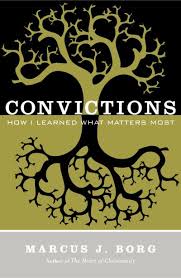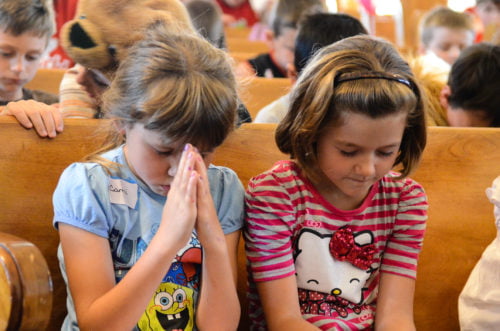 I miss being an evangelical . . . sometimes.
I miss being an evangelical . . . sometimes.
I've been thinking a lot lately how much simpler my life felt when I found myself in the "I am an evangelical" wearing t-shirt days of my childhood.
My church told me what to believe. If I proclaimed a Bible without errors, pro-life convictions, and men as the spiritual leaders of the church, then my beliefs were called good.
My church offered great ways to spend my free time. If I visited Christian conference centers, summer camps and coffee shops with Bible verses on the door, then I could play with confidence knowing I was having appropriate fun.
My church gave me a language to make friends. If I uttered phrases like "I prayed about it" or "I feel led" or "God laid something on my heart," then doors for immediate connection could be opened.
Best of all, my church gave me a path to sainthood. If I gave up my privilege in the United States of hot showers, Calvin Klein jeans and fast mail or internet service as a missionary in Africa, then I was perceived a better Christian than most. Who doesn't want this?
What a life plan! But, it's not easy to live up to this kind of life for the long-term, especially if you a woman, especially if you are a woman called to ministry, especially if begin to believe more in God as mystery than God as THE answer.
These days, I'm proud to be an open-mind Christian who has found a home in the ecumenical movement of the mainline church. I was ordained American Baptist but I serve churches on a weekly basis of all different Christian denominations (and sometimes those of no denomination at all).
Even with this true, recently I attended a conference attended mostly by folks who'd call themselves conservative evangelical Christians, a feeling of loss hit me again.
It was such a pretty scene. So many put together people in one place! I must tell you they were so beautiful!
Everyone brought their Bibles.
Everyone seemed to know each other and the same songs.
No one objected when only men preached or led in prayer.
I felt like an outsider in a tradition that I had once called my own.
But even though progressive Christianity doesn't seem to draw big crowds or get mainstream attention, I know I don't miss the evangelical church enough to go back.
I'm glad that the sponsor of my ordination supports my calling as a woman in ministry, interfaith dialogue and missions that looks more like doing good works than saving souls with words.
I'm glad I could write a spiritual memoir as I did with Birthed: Finding Grace Through Infertility and talk openly about depression, divorce and drinking without worrying about being a church outcast.
I'm glad to be schooled by wise new teachers that would never be found on the bookshelves at places like Lifeway or Family Christian Stores like Barbara Brown Taylor, Anne Lamott, Parker Palmer, and Kathleen Norris.
 And I'm glad for voices like Marcus Borg who give words to my convictions in ways resonate with my core beliefs. Recently I read his book, Convictions: How I learned What Mattered the Most.
And I'm glad for voices like Marcus Borg who give words to my convictions in ways resonate with my core beliefs. Recently I read his book, Convictions: How I learned What Mattered the Most.
In his opening pages, Borg says this about what progressive Christianity is all about. Here are some my favorite highlights:
I don't know where you find yourself, dear blog reader on the spectrum of Christianity. I hope that you still feel welcome here even if your beliefs are different from mine. Because what I want most for you is what I want most for me when it comes to faith: authenticity.
A place to believe what you actually believe. A place to ask the questions you need to ask. A place to show up without pretenses.
If there's anything I know about what this world needs more of when it comes to religious practice it is telling the truth (even if that leads us from one branch of religion and send on our way to another!). Thanks for listening to mine.
As a child growing up in an evangelical branch of the church, I was taught that prayer was talking to God.
It was right to give thanks to God for food. (God is great. God is good, anyone?)
I was encouraged to pray for those who were going through difficult times. (There's nothing longer than a church prayer list is there?)
I learned that if you didn't confess sin before you prayed then God wouldn't be too happy with you. (I can just hear one of my Sunday School teachers saying: "Confess, confess, confess!")
And, while I learned a lot all through these years of Christian education-- all of the "rules" of prayer seemed to be just that, rules.
I didn't understand why my relationship with God needed to look one way. Did it have anything to do with my particular personality? I wondered. 
I know that's not something that preacher types usually share; for they fear it will ruin their holy complex. Well, if you have a holy complex about me, let it go now. I'm just a human being like everyone else.
Sure, I could stand up in church on Sunday mornings and ask God to bless the sick in my congregation, those with troubles in the world and find a way to end with the Lord's Prayer-- but things weren't so intimate with God and me.
I didn't see the point, especially as I walked through difficult situations and nothing about my situation seemed to change . . . (insert forthcoming memoir on infertility here).
But over the last year or two, this has shifted. And I now pray for completely different reasons. My baby steps back toward prayer centered on praying for those I love.
I don't know if you are like me or not, but when I love, I fiercely love.
I love my congregation members if I'm serving a particular church.
I love my husband.
I love my dear kindred friends.
I love those that find a way to intersect my life in unique ways.
And for me, sometimes, it is hard to know what to do with that love. I truly want the best for them. I want to see them thrive. I want life to be as good to them as it possibly can. However, there comes a time when relationally I have done or can do all I can, but yet my heart isn't at peace for them. So I pray. I find joy in giving those I love to God.
A funny thing has happened to me along the way. I have found myself wanting to pray more. It's no longer a chore. It's a sweetness in my day. It has become a relationship between God and my community.
While many might think, it's shallow-- to just pray for people who you love-- I say, don't judge too quickly. In getting the conversation going again, God has come near to me in other ways. I'm beginning to get back to all the other stuff too like "Oh, God I have fallen short of your best for me in this way" or "Oh, God bless those in need in far away places" or "God bless so and so who really annoys me."
So, why do I pray now?
But, like any relationship I know a spiritual life has ebbs and flows. But prayer is the conversation starter.
This is what I know for sure: I am a creation of the great Creator who loves me. I want to grow to love God more. So I learn to pray.
Why do you pray?
 When I was growing up in the Southern Baptist Church, I learned the Christian life was about these things:
When I was growing up in the Southern Baptist Church, I learned the Christian life was about these things:
I don't think my faith is could be measured by any of these acts anymore, but it doesn't mean I've thrown scripture out.
Paul had some words to share on the manner to the church in Philippi. As his parting gift to this congregation that had meant to so much to him as a missionary and preacher—he too wrestles with the question of what does it mean to live a Christian life.
The book of Philippians is the known as one of the happiest books in the Bible. It’s one of those books that you just feel inspired and convicted by all at the same time. It’s a book often cited by many Christians as their favorite book of the Bible. And I have to say it tops the favorite list for me.
But there's one catch about this book: Paul is writing while in prison. He’s been put in chains in Rome on behalf of his faith that the governmental leaders at the time didn’t like too much. His death might be near.
It’s almost like Philippians becomes his last word and testament: everything Paul has always wanted to say (or say again) and hasn’t had a chance yet.
And by time we reach chapter 3, we’ve gotten to know Paul at deeper level when he boldly proclaims that “everything was a loss in comparison of the gift of knowing Jesus” and that most of all Paul wants “to know the power of his resurrection and share in the fellowship of his sufferings.”
So, when we reach chapter 4, I can imagine that some of the readers of this letter were bursting, were overflowing, were saying, “Stop, stop, Paul. You’ve given us so much to take in. We can’t take any more.”
But what Paul does is give them more. Every good speech needs a strong concluding hook, right? Every great race needs a victory lap right? Every want-a-be graduate of the ways of Jesus needs “This is now how you live,” right?
And so we arrive at: “Advice for the Christian Life by Paul.”
Several years ago, Katie Couric, popular news anchor and journalist—was asked to give the commencement address at a university in Cleveland, OH. Quickly, she found herself in a quandary as to what to say. She wanted to do a good job, and thought of the idea of crowd sourcing many of her famous friends, asking as many the question: “What was some the best advice you’ve ever gotten?”
Katie was overwhelmed by the response and the generosity of time and thought of many that she began piecing all of the responses together—not just for this one commencement address but for a book published in 2011 called, The Best Advice I’ve Ever Gotten.
One such entry in Katie’s book came from, Joyce Carol Oats, award-winning author, poet and playwright. She offered advice to any young people seeking to walk in her footsteps with these words:
Don’t be discouraged!
Don’t be envious of others!
Read widely—what you want to read, and not what someone suggests you should read.
Forget “should.”
Don’t expect to be treated justly by the world, though you might try to treat others justly.
Don’t too quickly cut yourself off from the possibilities of experience.
Don’t give up. What is to say, don’t be discouraged!
Take all advice with the proverbial grain of salt.
And even if we are not aspiring to be writers or artists—Joyce Carol Oats gives us some pretty wise offerings, don’t you think, in all her direct, staccato like statements?
Paul’s edition of “The Best Advice I have to give you” comes to us in a similar fashion. It’s clearly to the point that you can almost feel him in the room beside as he’s saying these words:
“Rejoice in the Lord always. Again I say rejoice. Let your gentleness be known to everyone. The Lord is near. Do not worry about anything, but by prayer and supplications present your requests to God. And the peace of God that passes all understanding will guard your heart and mind in Christ Jesus.”
What’s most interesting to me about this text is how much Paul changes gears from chapter 3 to chapter 4. In chapter 3, we almost feel out of breath with him in the running the race metaphors and fighting the good fight.
But Paul's “best advice ever given” starts with: “Therefore, my brothers and sisters . . . stand firm in the Lord.”
Stand firm is a very different from pressing on the race isn’t it?
 Trying to reconciling these images is complicated! But one of my professors from seminary; Susan Eastman offers some suggestions saying that the answer lies in the prepositional cause “in the Lord.”
Trying to reconciling these images is complicated! But one of my professors from seminary; Susan Eastman offers some suggestions saying that the answer lies in the prepositional cause “in the Lord.”
Eastman writes, “In the Lord, our forward movement [in the spiritual life] is like our constant movement on the surface of the earth; we are held fast by gravity at the center . . . constantly in motion but also constantly at rest.”
She goes on to say that we can’t just be in motion, doing, doing, and doing all the time in our spiritual lives without rest because: “Without this center of gravity, this grounding in the settled presence of Christ . . . the life of faith as a race quickly become frenetic and destructive.”
Or in other words—Paul is saying the Christian life is not just about what we do but it is about how we’re standing and who’s holding us. And that’s Jesus.
Yes, we strive for the spiritual disciplines to know Him and we run the best race we can. But, at the same time we remain planted in Lord. We wait upon the Lord. We are still. We allow the Lord to do what only the Lord can—which is of course a great mystery to us.
We do so because the kingdom of Jesus abides in a whole other reality—a reality that is not based on what we see, what we can rationally prove, or even how we feel about our lives on any given day. And this reality is what Paul exhorts us to stand firm in. Just as David wrote about in the great Psalm of the church: “The Lord is my Shepherd. I shall not want. He leads me by still waters . . . “
For the Christian life, my friends, is not just about what we do. The kingdom of Jesus is about something much deeper and embodied. So in the end, this passage which at first glance may appear to be a laundry list of instructions for living—becomes words that point back to Jesus. The One who simply asks us to stand firm.
So, how do you live the Christian life? When in doubt, stand firm. Jesus will take care of the rest! No evangelical checklist needed.
 I grew up in an evangelical, Bible-belt household.
I grew up in an evangelical, Bible-belt household.
I was taught that females shouldn't lead churches (though being international missionaries was ok-- out of sight out of mind).
I was taught that being gay was a sin. I was taught that the Bible was the infallible word of God. To be angry with how Paul referred to women was disrespectful.
To be a good Christian, I needed form myself into this mold. And who doesn't want to be good?
Being a good Christian was about following rules. Being a good Christian was about doing good to others, especially those who had not yet prayed the sinner's prayer of forgiveness (because maybe one day you could lead them to faith). Being a good Christian was about keeping your life close to those who believed just like you-- for to spend too much time with those who were not Christians could pollute your own relationship with Jesus.
For many years, I did well at this gold star obtaining way of faith. I read my Bible a lot. I went to church a lot. And I even tried to evangelize my unsaved friends (you know who you are).
But what happens when a girl like this grows up and begins to ask questions?
What happens when a girl like this has a moment one day on a mission trip wondering what in the heck she is doing trying to force a 7-year-old in a park to ask for forgiveness of sins?
What happens when a girl like this has a calling to actually LEAD a church (and the gifts and education to do so)?
What happens when a girl like this meets some of the most Jesus loving people she's ever met who happen to be gay too?
I guess there were two choices.
1) Become disillusioned to the whole Jesus thing saying Christians were stupid and I wanted no part.
2) Seek out a path of different kind of Christianity, even if it might leaving behind the church that raised me and my most familiar tradition behind.
Obviously I chose the second path.
Without shame, I took preaching classes at seminary, sought out a job that would allow me to preach and became ordained.
I read scripture with an open mind and have continued to do so.
I led a church that welcomed all kinds of people-- those in AA, those with criminal records, those who were gay, soccer moms with drug problems and even me, a pastor with more questions than answers. (Because we are all really broken in some way).
And here's my current challenge: I find myself as a "Preacher on the Plaza" (i.e. a pastor without a church) where the powers that be around me would love me to bow down and become more "that kind of Christian."
Don't I know my place? Couldn't I be more submissive? Shouldn't I be more accepting of those who who might just need more time to be more loving?
I can't, my friends. I can't.
I can't because I believe the love of God is wider than we could ever imagine.
I can't because I believe this world needs voices louder those of Christian majority-- voices that embrace before they judge.
I can't because I believe that revelation of God is finished; we're all a part of a living and active story.
The best is yet to be! And I want to be a part of it. I want to be a pastor to those who have been hurt by the church and its messages the most.
So, here I stand as not that kind of Christian. But a Christian nonetheless.